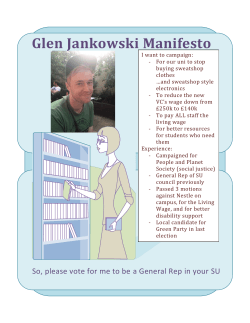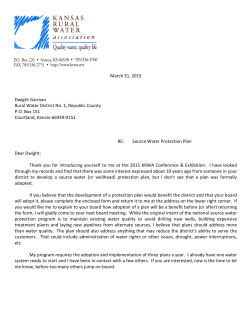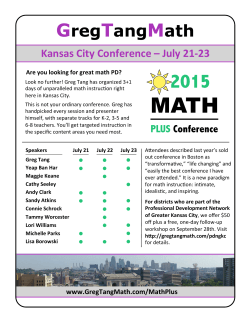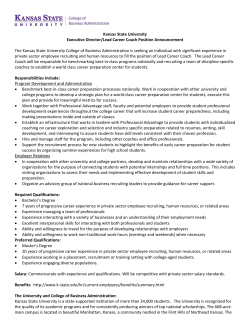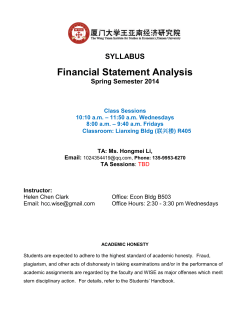
Spring 2015 NEWSLETTER.pages
MAPJ News, Spring, 2015 - p. 1 NEWSLETTER The Manhattan Alliance For Peace and Justice educating and organizing for peace and justice at home and abroad. Visit us online at: http://www.mapj.org Annual Meeting: Program & Potluck The Fight for $15 and a Union: from KC to the National Movement Speakers: Terrence Wise and Michael M. Enriques In November of 2012, 200 fast food union. He is a local and national leader, whom workers in New York City came together and the New York Times has called, “a strong went on strike for the first national voice in the time in American history. Fight for $15.” Terrence Saturday, March 28, 2015 Workers demanded $15 UUFM Building, 481 Zeandale Rd. has organized his coper hour and the right to workers, spoken to 5:30: Beer, Wine, Socializing form a union without world’s largest media retaliation, and called on outlets, and helped grow 6:00: Potluck Dinner other workers to join the campaign from a 7:00: Business Meeting them. Terrence Wise, a handful of cities to a full7:30: Speakers Burger King worker in blown movement. Kansas City, heard New Michael M. Enriquez York’s call to action. He is the Executive Director joined workers across Kansas City as they of the Workers Organizing Committee of KC, became the sixth city to strike in July of 2013. the citywide organization of fast food and lowFast food corporations generate great wage workers, and their Stand Up KC wealth, and great racial and economic campaign. He and Wise will speak about the inequality. The industry reports $200 billion in struggles of workers fighting to feed their profit, pays CEOs at the top brands (like families and win a union against some of the McDonald’s) $9,200 an hour, but consigns world’s largest corporations, and give insight workers to poverty wages and no benefits. into the character and scope of the nation’s This forces workers to rely on safety-net first movement of working people to challenge programs (like Medicaid and food assistance) the Great Age of Inequality in America. They and tax payers to subsidize corporate profits. will also discuss the upcoming national 4/15 Contrary to a myth perpetuated by the industry, mobilizations and the growth of the Fight for today’s fast food workers are not teens. The $15 to new industries including dollar store average fast food worker is 28 years old. workers and adjunct professors in Kansas City. Terrence will speak about his 17 years in the industry and why he’s fighting for $15 and MAPJ News, Spring, 2015 - p. 2 We are Worth More: Terrence Wise, the Face of Fight for 15 in Kansas City Taken from S. Greenhouse: Strong Voice in Fight for 15 Fast-Food Wage Campaign, The New York Times, December 4, 2014, http://nyti.ms/11Zltyf. Fight for 15 campaign for fast-food wage increase is not an anonymous struggle, taking place on the east and west coasts; it has spread to Kansas City and it has found a face and voice in Terrence Wise. The Fight for 15 campaign has become the largest “…the amount of income needed for a family to meet its basic needs without using public assistance.” The study, The Missouri SelfSufficiency Standard: Necessary Wages for Essential Needs, provides standards for every county in Missouri. It uses costs of labor protest in the country in years. Wise, a 30-something family man, often works two jobs and 16-hour days, averaging less than $8.50 an hour, to support his family. It’s not enough. Wise has worked in fast-food jobs since he turned 16 and his story is representative of fast-food workers nationwide. In 2000, a study by the Department of Economic Development (DED) Research and Planning unit for the Missouri Women’s Council defined economic self-sufficiency as basic survival needs (like housing and food) and takes into account family size, composition, and location. The living wage calculator for Kansas City, Jackson County, Missouri defines a living wage as “…the hourly rate that an individual must earn to support their family, if they are the sole provider and are working full-time (2080 hours per year).” Note that the state minimum wage is the same for all individuals, regardless of how many dependents they may have. >> MAPJ News, Spring, 2015 - p. 3 Continued from page 2 For the sake of comparison, the poverty rate is converted to an hourly wage. When the Fight for 15 campaign expanded to more than 100 cities across the country, including day. In November, he oversaw a 50-city conference call during which workers approved plans for the Dec. 4 strike against fast-food restaurants. The Dec. 4 strike was the eighth in a series of one-day strikes. The Living Wage Calculation for Kansas City, Jackson County, Missouri (2015) Hourly' Wages 1'Adult 1'Adult,' 1'Child 1'Adult,' 1'Adult,' 2'Adults 2'Children 3'Children 2'Adults,' 1'Child 2'Adults,' 2'Adults,' 2'Children 3'Children Living Wage $8.92 $17.91 $22.34 $28.55 $14.32 $17.14 $18.50 $22.08 Minimum' Wage $7.25 $7.25 $7.25 $7.25 $7.25 $7.25 $7.25 $7.25 Poverty' Wage $5.21 $7.00 $8.80 $10.60 $7.00 $8.80 $10.60 $12.40 Poverty in America: Living Wage calculator, http://livingwage.mit.edu/places/2909538000 Kansas City, MO, Wise joined the protest and demonstrated outside McDonald’s, Burger King, and Wendy’s restaurants. He likens the protests to other civil rights movements, acknowledging the fight may not be easy but is one that needs fought. As a volunteer for the movement, Wise was initially reluctant to be at the forefront of the national effort. He eventually agreed, realizing “We’re going to have to stand up and fight back.” Wise addressed the NAACP’s national convention to persuade them to endorse a higher wage. At the movement’s July, 2014 convention, Wise led a crucial segment that garnered support for a plan to commit civil disobedience. In September, he led a sit-in outside a McDonald’s in Kansas City where law enforcement arrested 52 Kansas City workers. Nationally, nearly 500 fast-food workers and supporters were arrested that Service Employees International Union has spent more than $10 million to support the movement, which they see as providing leverage to raise pay for low-wage workers nationwide. The fast food companies play down the protests, claiming that one-day strikes are not really strikes and that the efforts have not affected their operations. Officials of the fastfood industry call the movement a union front and claim the movement will hurt small and medium-size restaurant businesses—the independent pizza guy, the deli on the corner, the neighborhood bar and grill. However, Wise cites the Pizza Hut pay policy that states a maximum raise of 25 cents over three years. Wise insists a $15 hourly wage is not an impossible dream, “We have to build a movement for all low-wage workers.” MAPJ Board of Directors:! John Exdell, Chair; Annemarie Olson, Vice-Chair; Anne Cowan & Tom Manney, Treasurers; Sabrina Bowker; Barbara Krehbiel Gehring; Ekaterina Rosenberg; Leo Rosenberg; and Ellen Welti MAPJ News, Spring, 2015 - p. 4 Conserving Catastrophe By Stan Cox Stan Cox, a scientist at the Land Institute in Salina, is a long-time member of MAPJ. As Naomi Klein points out in her book This Changes Everything: Capitalism vs the Climate, some of the big business interests that have long fought the idea of human climate disruption are now itching to fix the climate with geoengineering. And the helpful geoengineer could turn out to be even more dangerous than the most bitter climate denier. Aerosol injection is the most likely choice for re-engineering of the Earth's climate. A sulfuric acid mist launched into the stratosphere would reflect some solar radiation back into space, leaving less heat to be trapped in the atmosphere. The idea has now flourished well beyond the world of mad scientists, despite almost certain, alltoo-predictable side effects. Agriculture in already-cold regions would be crippled. There would be acid rainfall, increased eutrophication of lakes, drought in the Amazon basin, and a stirring of tropical cyclone activity in the Arabian Sea and South Atlantic. Aerosols could trigger drought in Africa's Sahel region as they did in the 1970s. They would neither curb ocean acidification nor stop the disintegration of the West Antarctica ice sheet. An aerosol curtain would permit or even encourage business-as-usual carbon emissions to continue. Any cessation of the injection program would then mean sudden, dramatic, and much more catastrophic warming. Whether or not greenhouse emissions are reduced, injection would have to be repeated regularly and perpetually. Fears that geoengineering could make things worse, not better, are reinforced by sad experience. In 1989, years before aerosol injection would be proposed, the historian William McNeill even argued that there exists a “law of conservation of catastrophe,” dictating that when economies repeatedly fend off catastrophic events with technological or financial wizardry, they only guarantee future disaster. McNeill first discussed well-known failures to gain permanent control over the Mississippi River and China's Yellow River. He wrote, "Intelligence and ingenuity in this and innumerable other cases run a race with all the nasty eventualities that interfere with human hopes and purposes . . . Human history thus becomes an extraordinary, dynamic equilibrium in which triumph and disaster recur perpetually on an everincreasing scale as our skills and knowledge grow." After drawing comparisons with cycles of economic growth and collapse, McNeill concluded, “It certainly seems as though every gain in precision in the coordination of human activity and every heightening of efficiency in production were matched by a new vulnerability to breakdown. If this really is the case, then the conservation of catastrophe may indeed be a law of nature like the conservation of energy.” Two ecologically calamitous decades later, Monthly Review editor John Bellamy Foster argued that the conservation of catastrophe had become even more obvious. However, Foster noted, McNeill's thesis needed to be understood not as growing out of universal human tendencies but rather as a predictable consequence of capitalism and the wealth accumulation that keeps it going. He observed, “Just as the short-term power of humanity over nature increased along with the scale of the economy, so did the long-run potential for ecological (and economic) catastrophe.” >> MAPJ News, Spring, 2015 - p. 5 Conserving Catastrophe (continued from page 4) Foster concluded that “what distinguishes our time from earlier centuries is not so much the conservation of catastrophe, which has long been recognized, but rather the accelerated pace at which such destruction is now manifesting itself, i.e., what I am calling the accumulation of catastrophe.” In particular, the atmosphere has been ruined not with the intention of causing catastrophe but rather because ruining it was profitable. Likewise, geoengineering would be deployed not to prevent catastrophe but simply because it will help keep the profits churning—for a while anyway. But fixing the atmosphere means restraint, not remodeling. LOCAL ELECTIONS – APRIL 7, 2015 BE SURE TO VOTE!!! CANDIDATES USD 383 School Board - Elect Four Manhattan City Commission Nicholas Dyer Mike Dodson Curt Herrman Jerrod McKee Darell Edie Wynn Butler Leah Fliter Linda Morse Dave Colburn John Ball ! Kaleb James Working to Overturn Citizens United by Debbie Plummer, MAPJ member Wolf-pac.com is a group of crosspartisans who would like to overturn the Supreme Court’s decision of Citizens United, which decided, “corporations are people and money is speech.” This Supreme Court decision has led to an almost billion dollar election process and a narrowing of opportunities for those who would like to run for office but aren’t millionaire/billionaires nor anywhere close to that economic standard. So, those with limited financial means are unable to participate in civic duties whereas those with huge financial advantages often win their elections, through dark money/PACs/ SUPERPACs/etc., but then spend 50% 75% of their DC days “dialing-for-cash” for their next campaign. I learned about wolf-pac.com through watching The Young Turks (tyt.com), whom I had been listening to for 10 years. They started in an apartment and now have their own “internet home” where they review/ critique/synthesize the news – international and national. A documentary on their history, called “Mad as Hell,” can now be downloaded on iTunes. Since the dramatic downfall of our media and its attachment to the FOX TV model of attraction, I’ve felt the need to search for alternative news sources. With the internet, searching for independent news became easier, although one has to be careful about agendas/background/financial backing sources. In some ways, “wolf-pac.com” is similar to one of Larry Lessig’s models of overturning Citizens United. Lessig has been working for a long time to take money out of elections/politics. >> MAPJ News, Spring, 2015 - p. 6 Working to Overturn Citizens United (continued from page 5) He is calling for a limited states constitutional convention for an amendment to abolish the effect of the Citizens United decision. For such a convention to take place, over 30 state legislatures would need to pass a resolution in support. To gain state support we should call/visit our own Kansas legislators with a prepared script asking about the resolution and supporting a limited convention, to add the 28th Amendment that would overturn Citizens United. The goal is to find state legislators who support the effort, and then check back with them as often as needed to offer support for action. Four states have passed their resolution – CA, NJ, IL, and VT. At our Kansas capitol, a few individuals are “kind-of interested” in supporting the resolution. We need to work for a limited convention – one addressing only Citizen’s United. At Wolf-pac.com we are provided with scripts, history, documentaries, PBS shows, articles, etc. to share with the representatives and information to support our goal, which is to develop a 28th Amendment that would contain these elements: "Corporations are not people. They have none of the Constitutional rights of human beings. Corporations are not allowed to give money to any politician, directly or indirectly. No politician can raise over $100 from any person or entity. All elections must be publicly financed." MAPJ is looking for a person to manage the MAPJ Website content. We will hire someone for five hours a week at $12 per hour. We require three references and experience with websites. If you are interested, send your resume to Tom Manney at treasurer@mapj.org To become a MAPJ member, send a donation or volunteer time for a project. We urgently need your support for our 2015 programming. ❑ $200 ❑ $100 ❑ $75 ❑ $50 ❑ $30 ❑ Other____________ ❑ Donation Enclosed ❑ Pledge to be paid ________ (date or dates) J O I N Name:____________________________________________________ Address :_________________________________________________ City:_______________________State:_________Zip:______________ Phone:_________________ Email:______________________ ____ I wish to be included on the MAPJ eMail Announcement list. ____ I would like to be contacted so I can be more involved in MAPJ ____ I wish to receive the MAPJ Newsletter by eMail __ , Postal ___ For a tax deduction make checks payable to “MAPJ ED Fund”! Send to: MAPJ, PO Box 1561, Manhattan, KS 66505 MAPJ News, Spring, 2015 - p. 7 Civil Rights Attorney Describes Being in the Movement in Mississippi in 1960s by Ekatrina Rosenberg On Wednesday, February 25, 2015, Manhattan’s community gathered at the Leadership Studies Town Hall at K-State. Over 100 people attended Eric Seitz’s powerful and inspirational talk on civil rights. Eric started his speech by going back to the 1960s, when he and his Oberlin College classmates felt compelled to join the southern civil rights movement. In December, 1964, they went to Mississippi to rebuild a church that had been bombed by segregationists for taking part in civil right activities. Young and fearless, they entered an unsafe zone. Protected from attackers at night by sandbags, they defended their core beliefs and rebuilt the church. The church, a symbol of civil rights and liberty, still proudly stands in Mississippi. Martin Luther King Jr. had presented an influential speech at Eric’s graduation, and Eric shared a recording of this speech: Do not sleep through the revolution was Dr. King’s message. In this country, we are always battling for our right to be treated as equal citizens. The most basic needs — access to education, housing, and healthcare — should be considered core civil liberties. African Americans, and now the fast growing population of immigrants who have become integrated into our community need equal access to these essentials. Absence of equal access is detrimental to our society. For instance, many minorities’ future success depends on the environment in which they grew up. However, as schools are often financed by local districts, there is a visible shortage of adequate schooling in poor neighborhoods, which, from the very start, sets up underprivileged communities for failure. Eric observed that corporations are not going to voluntarily give up their powers and allow equal redistribution of funds among our society. Their main focus is to keep their shareholders happy and not to prioritize public good. Eric added that there will need to be a revolution, but he does not foresee it happening in his lifetime because people are sleeping through social injustice. He called on us to keep our eyes open as we continue to fight for civil liberties and against injustices. On a daily basis, it is important to take an active role in the civil rights movement in order to generate an actual change in this world. MAPJ News, Spring, 2015 - p. 8 Chair: John Exdell (chair@mapj.org) Contact Information Vice-Chair: Annemarie Olson (vice-chair@mapj.org) Treasurers: Tom Manney & Anne Cowan (treasurer@mapj.org) Coordinator: Brenda Mayberry (coordinator@mapj.org) Campus Organizer: Tyrone S. Williams II (campus-organizer@mapj.org) Webmasters: Leo Rosenberg & Nicholas Domoney (webmaster@mapj.org) Newsletter Editor/Layout: Tom Manney (newletter-editor@mapj.org) Committees: To become more involved, e-mail coordinator@mapj.org to join one of the following committees: El Salvador Sister City; Programming; Legislative Action; Newsletter; Nominating; Website. MAPJ# PO Box 1561# Manhattan, KS 66505# PRSRT STD US Postage PAID Permit Number 4 !Return Service Requested MARCH 14 – St. Patrick’s Day in Aggieville 16-‐20 – KSU Spring Break 18 – Begin advance voting for City/school elections 19 – MAPJ Board Meeting: 7 pm, UFM, 1221 Thurston St. All members welcome 22 – Voice for Justice Meeting: 2 pm, First United Methodist Church: Working to assist undocumented residents of Manhattan. If questions, contact Anne Cowan at anne_cowan@sbcglobal.net 24 – Lecture by Erin Khue Ninh, Annual Cultural Studies Symposium: 4 pm, Room 13 Leasure Hall (Contact: english@ksu.edu) 28 – MAPJ Annual Meeting at UUFM, 481 Zeandale Rd. Potluck/business meeting/ speakers. See Front page of newsletter APRIL 5 – Easter 7 – City/School elections 19 – Voice for Justice Meeting: Presentation from Jessica Piedra, Immigration lawyer. 1:30 pm, location to be announced 23 – MAPJ Board Meeting: 7 pm, UFM. All members welcome MAY !8 – K-State Spring Term ends 15-‐16 — K-State Graduation Ceremonies
© Copyright 2024
